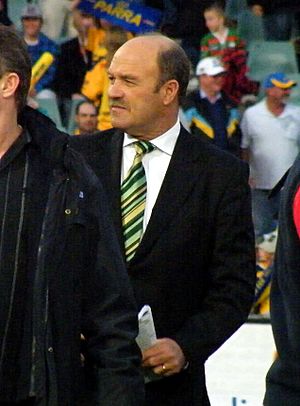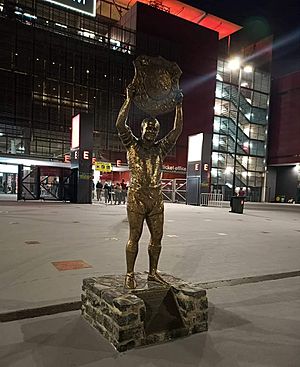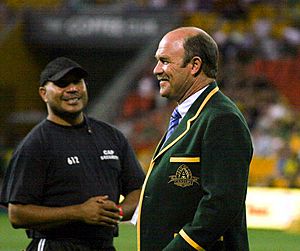Wally Lewis facts for kids

Lewis in 2009
|
|||||||||||||||||||||||||||||||||||||||||||||||||||||||||||||||||||||||||||||||||||||||||||||||||||
|
Personal information
|
|||||||||||||||||||||||||||||||||||||||||||||||||||||||||||||||||||||||||||||||||||||||||||||||||||
|---|---|---|---|---|---|---|---|---|---|---|---|---|---|---|---|---|---|---|---|---|---|---|---|---|---|---|---|---|---|---|---|---|---|---|---|---|---|---|---|---|---|---|---|---|---|---|---|---|---|---|---|---|---|---|---|---|---|---|---|---|---|---|---|---|---|---|---|---|---|---|---|---|---|---|---|---|---|---|---|---|---|---|---|---|---|---|---|---|---|---|---|---|---|---|---|---|---|---|---|
| Full name | Walter James Lewis | ||||||||||||||||||||||||||||||||||||||||||||||||||||||||||||||||||||||||||||||||||||||||||||||||||
| Born | 1 December 1959 Hawthorne, Queensland, Australia |
||||||||||||||||||||||||||||||||||||||||||||||||||||||||||||||||||||||||||||||||||||||||||||||||||
|
Playing information
|
|||||||||||||||||||||||||||||||||||||||||||||||||||||||||||||||||||||||||||||||||||||||||||||||||||
| Height | 182 cm (6 ft 0 in) | ||||||||||||||||||||||||||||||||||||||||||||||||||||||||||||||||||||||||||||||||||||||||||||||||||
| Weight | 95 kg (209 lb; 14 st 13 lb) | ||||||||||||||||||||||||||||||||||||||||||||||||||||||||||||||||||||||||||||||||||||||||||||||||||
| Position | Five-eighth, Lock | ||||||||||||||||||||||||||||||||||||||||||||||||||||||||||||||||||||||||||||||||||||||||||||||||||
|
|||||||||||||||||||||||||||||||||||||||||||||||||||||||||||||||||||||||||||||||||||||||||||||||||||
|
Coaching information
|
|||||||||||||||||||||||||||||||||||||||||||||||||||||||||||||||||||||||||||||||||||||||||||||||||||
|
|||||||||||||||||||||||||||||||||||||||||||||||||||||||||||||||||||||||||||||||||||||||||||||||||||
Walter James Lewis AM (born 1 December 1959) is a famous Australian former professional rugby league player and coach. He is known as one of the greatest rugby league players ever. After his playing and coaching career, he became a sports commentator on television.
Wally Lewis is often called The King or The Emperor of Lang Park. He played for Queensland in 31 State of Origin games from 1980 to 1991, leading his team as captain in 30 of them. He also played for Australia in 33 international matches from 1981 to 1991, captaining the national team from 1984 to 1989.
Lewis is especially famous for his amazing performances in State of Origin. He helped Queensland dominate the competition throughout the 1980s. He won a record 8 "man of the match" awards in these games.
He has been honored in many ways, including being inducted into the Australian Rugby League Hall of Fame. In 1999, he became the sixth member of 'The Immortals', a special group of the sport's greatest players. In 2000, he received the Australian Sports Medal for his contributions to rugby league.
In 2008, Lewis was named one of Australia's 100 Greatest Players to celebrate 100 years of rugby league in Australia. He was also chosen for the Kangaroos' Team of the Century as a halfback. In June 2008, he was picked as five-eighth and captain for the Queensland Rugby League's Team of the Century. In 2016, he became the 38th Legend of Australian Sport at the Sport Australia Hall of Fame.
In 2009, Wally Lewis was named one of the Q150 Icons of Queensland for being a "sports legend." In 2011, he received a Queensland Greats Awards.
Contents
Early Life and Sporting Beginnings
Wally Lewis was born in Hawthorne, Queensland on 1 December 1959. His father, Jimmy, was also a rugby league player and coach. His mother, June, played netball for Queensland.
Wally started playing rugby league at six years old with the Cannon Hill Stars. He often played as a lock forward. He also played for junior Queensland school teams, sometimes against New South Wales.
In 1977, while still in high school, Lewis played rugby union as a Centre. He toured Europe and Japan with the Australian schoolboys team. Some of his teammates, like Michael O'Connor, later played alongside Lewis for the Kangaroos in rugby league.
This 1977 tour was the first of three times Lewis would go on undefeated tours of Britain with Australian national teams. Wally and his brother Scott, who also played rugby league, were butchers by trade.
Rugby League Career Highlights
Starting with Fortitude Valley
After his schoolboys tour, Lewis faced problems in rugby union because he also played rugby league. He decided to focus on rugby league and joined the Valleys Diehards in the Brisbane Rugby League premiership in 1978.
In 1979, Lewis played his first senior game for Queensland. He also helped Valleys win the premiership against the Souths Magpies. A young player named Mal Meninga, who would become a long-time teammate, played for the Magpies that day.
The First State of Origin Games
Lewis played in the very first State of Origin match in 1980 as a lock forward. He played alongside his hero, Arthur Beetson. Lewis helped set up Queensland's first-ever State of Origin try.
In the second State of Origin match, Beetson was injured and chose 21-year-old Lewis to be captain. Lewis moved to play five-eighth, a position he became famous for.
His great form led to his Test debut for Australia in 1981 against France. During this game, Lewis almost scored his first test try but passed the ball to his teammate Steve Mortimer. He later found out he passed because he heard the referee behind him, thinking it was an opponent!
Becoming an "Invincible"
In the 1982 State of Origin series, Lewis scored his second Origin try and won his first "man of the match" award. Later that year, he was part of the 1982 Kangaroo tour as vice-captain. This Australian team made history by going through Great Britain and France undefeated. They earned the nickname The Invincibles.
Lewis had to work hard to get into the test team during this tour. He trained harder and lost weight. He became a key player, especially in the second test in Wigan. He made a famous long pass to Mal Meninga that surprised everyone. These long, accurate passes became a signature part of Lewis's game.
Lewis captained Australia for the first time in an international match against Wales during this tour. He scored a try and kicked four goals in the win.
Playing in England and Returning Home
Lewis played for the English team Wakefield Trinity for a short time during the 1983–84 Rugby Football League season. He became a favorite among fans, who even named their fanzine Wally Lewis is Coming. He scored three tries in one game against St. Helens.
Back in Australia, Lewis joined the Wynnum-Manly Seagulls in 1984. He became the national captain for the first time in the 1984 Ashes series against Great Britain. He was the first Queenslander to lead Australia to an Ashes victory. Lewis also won the Golden Boot Award in 1984, given to the world's best international player.
He continued to win "man of the match" awards in State of Origin. In 1986, Lewis became the captain-coach of Wynnum-Manly and led them to a premiership win. He then became the first Queenslander since 1929–30 to be named captain for a Kangaroo tour. The 1986 Kangaroos went undefeated, earning the nickname The Unbeatables.
Joining the Brisbane Broncos
In 1988, Wally Lewis finally played in the Sydney premiership when he joined the Brisbane Broncos. He was the first captain of the new team. He led the Broncos to a big win in their very first game against Manly. Lewis was the Broncos' top try-scorer in their first season and scored the club's first hat-trick.
In 1988, Lewis won the Harry Sunderland Medal as Australia's best player in the Ashes series against Great Britain. He also captained Australia to victory in the final of the 1985 - 1988 Rugby League World Cup against New Zealand. During this game, he broke his right forearm but bravely played on for 20 minutes before being replaced.
Lewis won another "man of the match" award in the second game of the 1989 State of Origin series. He scored a famous try, running 40 meters and beating several defenders.
Later Career and Coaching
At the end of the 1990 season, Lewis left the Broncos. In 1991, he joined the Gold Coast Seagulls as captain. He won his eighth and final "man of the match" award in the first game of the State of Origin series that year. He played his last games for Queensland and Australia by the end of 1991.
He captained and coached Gold Coast in 1992, and continued coaching in 1993. He also coached the Queensland State of Origin side in 1993 and 1994.
Wally Lewis's Legacy
Wally Lewis is remembered for his creative playmaking and exciting moments on the field. The Wally Lewis Medal is awarded to the best player in the State of Origin series each year.
A bronze statue of Wally Lewis stands at the entrance to Lang Park (now Suncorp Stadium) in Brisbane. The statue's text calls him "The Emperor of Lang Park" and highlights his incredible impact on the game. It mentions his status as a Rugby League Immortal and his record 8 "man of the match" awards in State of Origin.
Many famous sports commentators and players have called Wally Lewis the greatest rugby league player they have ever seen.
Lewis has also appeared in many advertisements during and after his playing career. In 2007, the Brisbane Broncos named him one of their 20 best players ever. In 2009, he was inducted into the Queensland Sports Hall of Fame.
Personal Life
In November 1984, Wally Lewis married Jacqueline. They have two sons, Mitchell and Lincoln, and one daughter, Jamie-Lee.
His son, Lincoln, is an actor known for the TV show Home and Away. His other son, Mitchell, works in radio in Brisbane. His daughter, Jamie-Lee, was born profoundly deaf. This led Wally to retire from Origin football after the 1991 series. Jamie-Lee is a talented water polo player who has represented Australia. She is the first deaf person to represent her country's national hearing team in water polo.
In May 2010, Lewis had surgery to remove his gallbladder. He also wrote an autobiography called Out of the Shadows: A Champion's Return to the Spotlight in 2009.
Wally Lewis is a big fan of The Phantom comic series. After retiring from playing, he became a television sports presenter, working for Seven Nightly News Brisbane and then Nine News Queensland until January 2023.
Living with Epilepsy
On 16 November 2006, and again on 30 November, Wally Lewis experienced disorientation while on air during a news broadcast. He later revealed that he has epilepsy, a condition that affects the brain and can cause seizures. He explained that his on-air difficulties were caused by this condition.
On 21 February 2007, Lewis had brain surgery at Austin Hospital in Melbourne to help with his epilepsy. The surgery was successful, and he has made a full recovery.
Lewis has shared that he doesn't remember many things from his rugby league career because of his epilepsy, which he finds "absolutely frightening." He now works with epilepsy organizations to raise awareness about the condition. He is also a vice patron of the Hear and Say Centre, a charity that helps deaf children, inspired by his daughter Jamie-Lee.
Statistics
Club Performance
| † | Denotes seasons in which Lewis won a BRL premiership |
| Season | Team | Matches | T | G | F/G | Pts |
|---|---|---|---|---|---|---|
| 1978 | 22 | 10 | 0 | 0 | 30 | |
| 1979† | 20 | 19 | 0 | 1 | 58 | |
| 1980 | 21 | 16 | 2 | 0 | 52 | |
| 1981 | 18 | 11 | 0 | 1 | 34 | |
| 1982 | 15 | 5 | 0 | 2 | 17 | |
| 1983 | 15 | 10 | 9 | 0 | 58 | |
| 1983–84 | 10 | 6 | 0 | 0 | 24 | |
| 1984† | 17 | 11 | 0 | 0 | 44 | |
| 1985 | 16 | 7 | 0 | 2 | 30 | |
| 1986† | 14 | 6 | 8 | 0 | 40 | |
| 1987 | 8 | 2 | 1 | 0 | 10 | |
| 1988 | 19 | 15 | 8 | 0 | 76 | |
| 1989 | 18 | 4 | 2 | 0 | 20 | |
| 1990 | 9 | 1 | 1 | 0 | 6 | |
| 1991 | 14 | 3 | 2 | 0 | 16 | |
| 1992 | 20 | 3 | 1 | 0 | 14 | |
| Career totals | 301 | 155 | 45 | 12 | 654 | |
Images for kids
 | Roy Wilkins |
 | John Lewis |
 | Linda Carol Brown |




